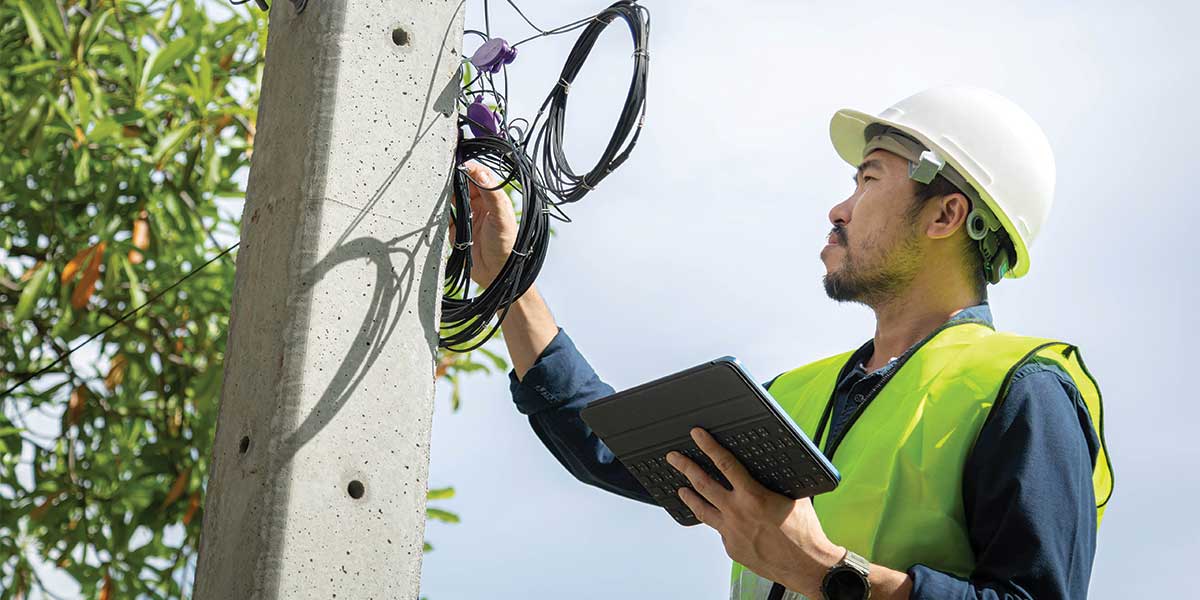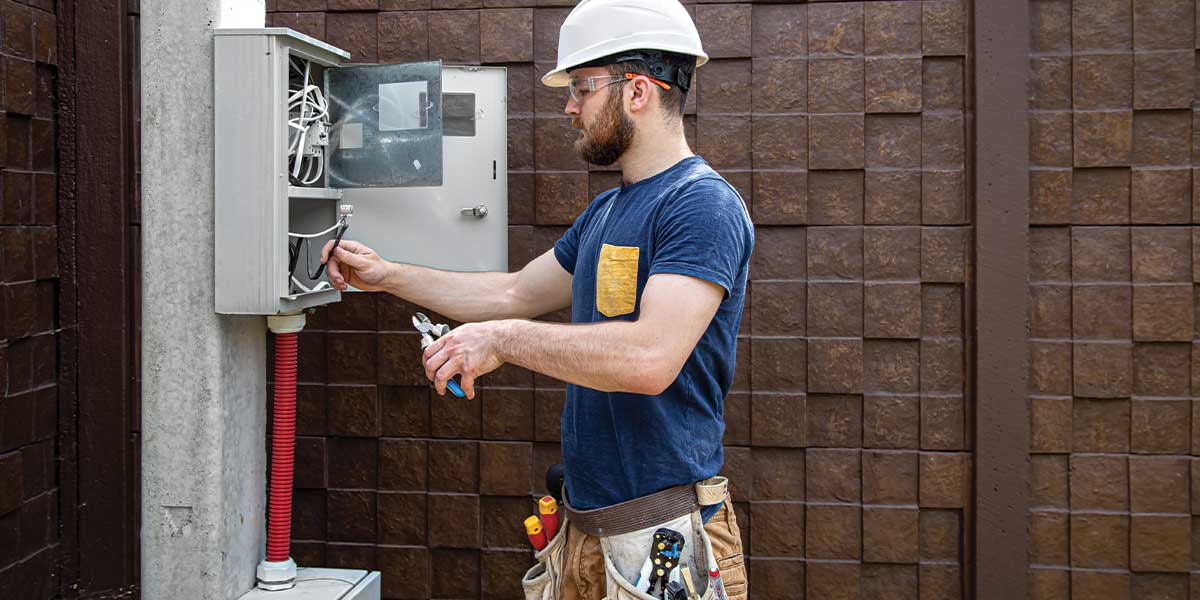As the seasons shift into Fall and Winter, outdoor activities become more appealing and more hazardous. Atmosphere and enjoyment aside, colder weather brings new outdoor electrical safety challenges. Proper guidance on outdoor electrical safety tips for avoiding electrical hazards is essential for a safe and festive season.
Outdoor lighting, power tools, wet conditions, and seasonal decor all require extra attention. Ensuring waterproof connections, GFCI protection, and professional inspection can prevent shocks, fires, and costly damage. The following guidelines will help homeowners follow the safest path.
Why Outdoor Electrical Safety Matters
-
Water + Electricity = Risk: Rain, melting snow, puddles, all increase the chance of short circuits and electrocution.
-
Seasonal lighting overload: Extra décor lighting can strain circuits or expose faulty insulation.
-
Increased equipment use: Leaf blowers, snow blowers, extension cords, and portable heaters add demand on circuits.
-
Outdoor structures: Pools, hot tubs, workshops, and sheds need proper grounding and protective devices.
Top Outdoor Electrical Safety Tips for Avoiding Electrical Hazards
1. Regularly Inspect and Audit Outdoor Electrical Equipment (Semi‑Annually)
Perform checks twice a year, ideally between Winter–Spring and Summer–Fall. Look for:
-
Frayed cords, missing insulation, exposed wiring
-
GFCI receptacles that fail to trip
-
Loose connections and unfastened outlets
If unsure, retain a licensed electrician like Expert Electric for a full audit.
2. Repair or Replace Loose or Damaged Wiring and Cords
Damaged wiring exposed to snow, leaves, or foot traffic can ignite severe hazards:
-
Immediately replace frayed cables or cords
-
Avoid cheap, uncertified extension cords, use CSA/ULC or CSA-certified equipment only
-
Never staple or nail through cords, this compromises insulation and may void appliance warranties or home insurance
3. Use GFCI Protection on All Outdoor Outlets
Ground Fault Circuit Interrupters (GFCIs) detect ground faults and shut off power rapidly:
-
Ensure all outdoor receptacles are GFCI‑protected
-
Test them monthly to confirm proper operation
-
Portable inline GFCIs should be used if permanent outlets aren’t GFCI-equipped
4. Keep Electrical Cords and Equipment Away from Water
Avoid placing cords across wet ground, puddles, or snowbanks:
-
Route cords along elevated, dry paths and away from gutters or melting roof runoff
-
Use weather‑rated (outdoor) extension cords
-
Avoid operating tools in rain, snow, or high humidity unless powered through GFCI environments
5. Maintain Safe Distance from Overhead Power Lines
When trimming trees or using ladders and long tools:
-
Keep at least 3 m (≈10 ft) clearance from overhead lines, per safety codes in Canada and BC
-
Never attempt to move live power lines, call the utility provider instead
6. Be Mindful When Using Generators, Power Tools, and Seasonal Equipment
-
Generators: Place at least 6 m (20 ft) from doors/windows, keep dry and ventilated; never back‑feed house wiring
-
Power tools: Always switch off before plugging in; use only with proper grounding or double insulation
-
Avoid overloading circuits, follow manufacturer limits
7. Follow Electrical Codes & Best Practices in Canada
-
Projects must comply with the 2024 Canadian Electrical Code (CEC) as adopted in BC
-
Wild temperature and moisture require outdoor-rated materials and grounding per CSA C22.x
-
Programs like CSA Z462 and CAN/ULC S801 define workplace safety and arc‑flash protection around electrical systems
8. Practice Lightning and Storm Safety
-
Never touch downed lines, treat as live until utility confirms safe
-
Avoid electrical work when thunder or lightning is nearby
-
Unplug outdoor loads and stay indoors during electrical storms
9. Avoid DIY Electrical Projects without Credentials
-
Complex installs like hot tub hookups or landscape lighting should be done by licensed electricians
-
Non‑professionals may overlook grounding, conduit, safe connections or code requirements
10. Proper Storage and Seasonal Care
-
Remove and store outdoor wiring and lights during off‑season
-
Ensure cords are dry, labeled and free from damage before reuse
-
Recharge or replace damaged plugs before next installation

FAQs
Q1: How often should I get my outdoor electrical system professionally inspected?
A: At least once a year, or after heavy storms, wear‑and‑tear, or before installing seasonal equipment. Expert Electric performs comprehensive inspections to meet all safety codes.
Q2: Are indoor extension cords safe for outdoor use?
A: No—indoor cords lack weatherproof insulation and can overheat or pose shock hazards when wet. According to Eversource’s outdoor electric safety guidelines, you should always use extension cords that are rated specifically for outdoor use, made with durable, weather-resistant materials and safety certifications.
Q3: What is a GFCI, and why is it important outdoors?
A: A Ground Fault Circuit Interrupter detects currents leaking to ground and cuts power in milliseconds protecting against electrocution in damp conditions.
Q4: Can I decorate my yard with holiday lights safely in winter?
A: Yes—as long as you use outdoor‑rated lights, test them first for damage, plug them into GFCIs, avoid overloading circuits, and secure them away from water.
Q5: Should I attempt basic repairs myself?
A: You can do visual checks and replace simple plugs or cords if you are capable but for wiring, hot tub hookups, or exposed installations, always call a licensed electrician.
Final Thought
Maintaining outdoor electrical safety is vital especially during Fall and Winter when moisture, cold, and festive lighting combine to elevate risk. A safety-first approach includes semi‑annual inspections, GFCI protection, proper cord routing, code compliance, and professional oversight.
Whether installing landscape lighting, powering seasonal equipment, or maintaining hot tubs and sheds, knowing the outdoor electrical safety tips for avoiding electrical hazards ensures you minimize danger and maximize enjoyment of your outdoor spaces.
Contact Expert Electric
Expert Electric is here to help residents across Metro Vancouver keep their electrical systems safe and compliant.
-
Call us: 604‑681‑8338
-
Email: info@expertelectric.ca
Let our licensed electricians audit and upgrade your outdoor electrical installations with precision and care. Invest in safety, reliability, and peace of mind today.


